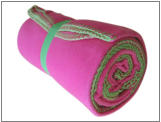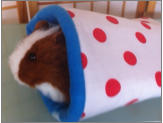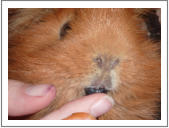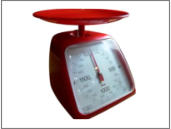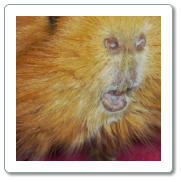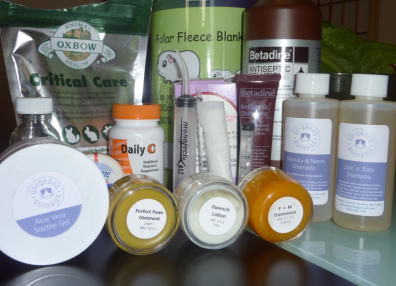NAVIGATION
© Copyright 2005 - 2016 All Rights Reserved
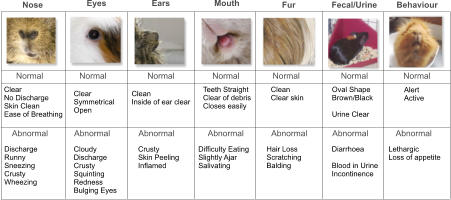
SENIOR GUINEA PIG CARE
Guinea pigs can suffer from conditions such as arthritis, eye
sight issues and can lose muscle and body mass as they
progress in age. The average life span of a guinea pig is 5 to 7
years. Some guinea pigs can live till 9 or 10 years. The official
record for the oldest guinea pig is 14 years and 10 and a half
months. Guinea pigs can be considered to enter their “senior”
years at around 4 to 5 years of age, or when symptoms of age
develop.
The key to ensuring your guinea pig maintains a healthy and
good quality of life is to be vigilant in obtaining prompt medical
assistance at the first signs of illness, weighing your guinea pig
on a weekly if not daily basis, and being aware of the first signs
of illness.
Guinea pig Health chart below indicates common symptoms
of Illness in Guinea pigs
Arthritis In Guinea Pigs
Guinea pigs like humans can develops arthritic symptoms:
"Guinea pigs spontaneously develop arthritis that bears
morphological, biochemical, and immunohistochemical
similarities to human osteoarthritis. It is characterized by the
appearance of superficial fibrillation by 12 months of age and
severe cartilage lesions andeburnation by 18 months of age."
Modification of osteoarthritis by pulsed electromagnetic field —a
morphological study D. McK. Ciombor Ph.D.†, R. K. Aaron M.D.*, S.
Wang M.D.† and B. Simon Ph.D.‡†Department of Orthopaedics,
Brown Medical School, Providence, RI 02906, USA ‡EBI, Parsippany,
NJ 07054, USA OsteoArthritis and Cartilage (2003) 11, 455–462 ©
2003 Published by Elsevier Science Ltd on behalf of OsteoArthritis
Research Society International.
Arthritis can not only effect senior guinea pigs but cavies from
12 months onwards. Arthritis is often exhibited by a stiffness,
inability to move or be as agile as they once were, or they are
hesitant in running, begging for food or doing exercise they
normally would do.
X-Rays can be extremely helpful in identifying which areas your
guinea pig is suffering from arthritic pain. An x-ray will usually
show a lump/swelling around a bone or joint where the arthritis
is present.
Your exotics veterinarian can help formulate a long term plan to
help manage day to day pain for your guinea pig, making their
life easier. Many owners find increasing the levels of vitamin C in
the diet can assist with inflammation often associated with
arthritis. Vitamin C can be given in a chewable vitamin
supplement in addition to vegetables high in vitamin C such as
capsicum, coriander and tomatoes. Oxbow chewable vitamin C
for small animals is recommended when choosing a supplement
for your guinea pig.
There are other treatments to combat arthritis which you can
discuss with your exotics veterinarian. These include: Metacam,
Meloxicam, Glucosamine and Cosequin medications to assist
with pain relief and inflammation. Unfortunately there is no cure
for arthritis so pain management is crucial to ensure your senior
guinea pig remains healthy and happy.
Tips to Maintaining a Good Quality of Life:
Ensuring your guinea pig is not only healthy but comfortable in
their senior years will help ensure they have a good quality of
life. Below are a few ideas to help keep your guinea pig
comfortable, happy and pain free:
Fleece bedding: Senior guinea pigs
can develops arthritic symptoms and
may find it easier to walk on a softer
surface. Polar fleece bedding offers a
soft, easy and comfortable walking
platform to allow ease of movement.
Choosing a lighter colour fleece can
also help monitor your guinea pigs urine and fecal output to
monitor signs of illness. For more information on fleece as a
bedding option click here.
Heat pads: Guinea pigs may find heat
pads and wraps helpful to alleviate
pain and aching joints. Heat pads can
be warmed in the microwave and can
be purchased at pharmacies, medical
supply stores or some retailers such
as Big W, and K-Mart. Please ensure
that any heat pads you place in your guinea pigs cage they can
easily walk away from if the heat become excessive. All pads
must be 100% securely wrapped with a towel or blanket. Never
expose your animals to any dangerous sources of heat.
Polar Fleece Pouches/beds/tunnels:
Guinea pigs love tunnelling and enjoy
a safe, warm place to snuggle up. A
piggy pouch or similar item is perfect
to allow your cavy to rest, re cooperate
and have a safe, comfortable place to
have a snooze. They offer a perfect
haven for warmth and are always
recommended as a great cage accessory. Guinea Pigs Australia
now offers hand made snuggle sacks with cosy fleece bedding to
purchase. See snuggle sacks for more information.
Perfect Paws Ointment: Senior
guinea pigs may develop or be prone
to dry cracked skin especially on the
soft pads of their feet. They may find it
harder to groom themselves so you
may need to invest in a safe ointment
to use on guinea pigs to ensure their
feet are well moisturised daily. The
gorgeous guineas range offers an ointment called Perfect Paws
which helps assist in dry, cracked paws designed specifically for
guinea pigs. Aloe-Vera soothe gels, foot and mouth ointments
and kwench lotion is also available to help care for your guinea
pigs skin, fur, and feet. See the Gorgeous guineas range of
products here.
Grooming: Some guinea pigs as time
goes on may find it difficult to groom
and care for themselves without
assistance. You may need to check
your guinea pigs bottom daily and
clean away any excess urine or fecal
matter. Gently using warm water
your can wipe away any urine or
fecal matter and towel dry. Always ensure your guinea pig is
completely dry prior to placing back in its cage. Trimming your
guinea pigs fur may be necessary to avoid urine from soaking
into the fur and skin. Always check your guinea pig daily, and
look at their paws, eyes, ears, nails, teeth and skin. Keep your
guinea pig clean by grooming them on a daily basis and always
ensure their cage is kept clean. See cage cleaning for more
information and our Bathing Guide.
Weight: Weight is vitally important for
pigs of all ages. Guinea pigs are prey
animals and may be able to hide or
cover any outward signs of illness.
Weigh your guinea pig on a weekly
basis. Weight loss is one of the first
signs of illness. Invest in a good set of
digital scales and record your guinea
pigs weight. Guinea pigs with a past history of illness and weight
loss, should be considered for daily weighing. See our weight
information page for more information.
Malocclusion and teeth issues:
Malocclusion in guinea pigs is when
the lower cheek teeth grow towards
each other and essentially "trap" the
tongue so it is difficult to move
causing starvation and weight loss.
The front incisors can also continue to
grow as the teeth are not wearing
down at a normal rate. Elongation of
the cheek teeth can also cause the
mouth to stay open which is known to
cause the masticatory muscles or chewing muscles to essentially
stretch and the mouth cannot close. There are many causes why
guinea pigs can develop malocclusion as it can develop at any
age. It can be genetic, a lack of fibre in the diet in the form of
grass hay, infections, trauma, jaw disease and bone disease.
Some veterinarians also consider Temporomandibular joint
disorder or TMJ a cause especially in senior pigs as the joint may
wear down over time and become weakened essentially allowing
the teeth to overgrow.
Always check your guinea pigs teeth on a daily basis, watch for
signs of teeth issues - these could range from not picking or
eating food as they usually do, drooling, excessive movement
when chewing, eye or nose discharge, weight loss or your guinea
pig has an appetite yet cannot eat.
Medical First Aid Kit
A great way to assist and care for your senior pig is investing in a
first aid kit. Guinea pigs can go downhill quite quickly and when
urgent medical assistance cannot be sought it may be necessary
to assist feed or care for your guinea pig. Some essential items
below should be kept in an emergency situation:
Oxbow Critical Care TM: Critical care is an assist feeding
formula for herbivores. It contains many of the essential
vitamins, minerals and fibre required when a guinea pig cannot
eat or has difficulty in eating. A guinea pig MUST have constant
access to food and water. Food is life. Critical care is available at
the listed veterinary practices - it can also be shipped from
veterinary surgeries if required. See a supplier list here
Syringes: Every first aid kit should have a 1 ml syringe. They can
assist with dispensing medicine, hand feeding critical care, fluids
and also flushing wounds. They can be purchased at pharmacies
and veterinary surgeries. It may be a good idea to also purchase
a cannula syringe for flushing abscesses and a 3 ml syringe for
thicker critical care assist feeds.
Bedadine Solution: A great antiseptic treatment,solutions are
10% povidone-iodine in water. Bedadine can help prevent
infection in open wounds and can assist in keeping wounds and
sores clean.
Foot and Mouth Ointment: Is an all natural ointment which has
been known to improve cases of Bumblefoot in guinea pigs.
Ointment for guineas with skin problems on their feet and
mouth. Can assist with mouth sores, scabs, and Bumblefoot. For
more information on Foot and Mouth Ointment Click Here
Perfect Paws Ointment: A soothing ointment that can be used
on cracked, dry or sore feet. Great for Senior Pigs and those
winter months. This ointment is designed to help piggies with
sore feet. Hard or cracked skin. For more information on perfect
paws ointment click here
Aloe Vera Gel - A plain gel made from an Organic Aloe Vera Gel
Base. No essential oils, so safe to use on pregnant sows. It is
soothing, cooling and can help to reduce heat and redness in the
skin. The one "must-have" product for your First Aid Kit. For
more information on Aloe-Vera Gel click here.
Kwench Lotion: Kwench Lotion has been designed for use in-
between MicroNeem baths / Melts to help with Fungal skin
problems including Ringworm. It is particularly effective around
sensitive areas on the face, in particular area around the ears
and eyes. A small amount is applied 2-3 times a day and rubbed
gently into the skin. This lotion is light, non-greasy and easily
absorbed by the skin. For more information on Kewnch Lotion
click here.
Vitamin C Tablets: Chewable vitamin C tablets can give an ill
guinea pig a boost of much needed vitamin C an essential daily
supplement. It is always a great idea to have a bottle in the
cupboard in case of an emergency. Guinea Pigs Australia
recommend Daily C by Oxbow TM.
Bandages: For wrapping and covering wounds. Do not use
sharp items to hold the bandage in place- a soft tape may be
more efficient.
